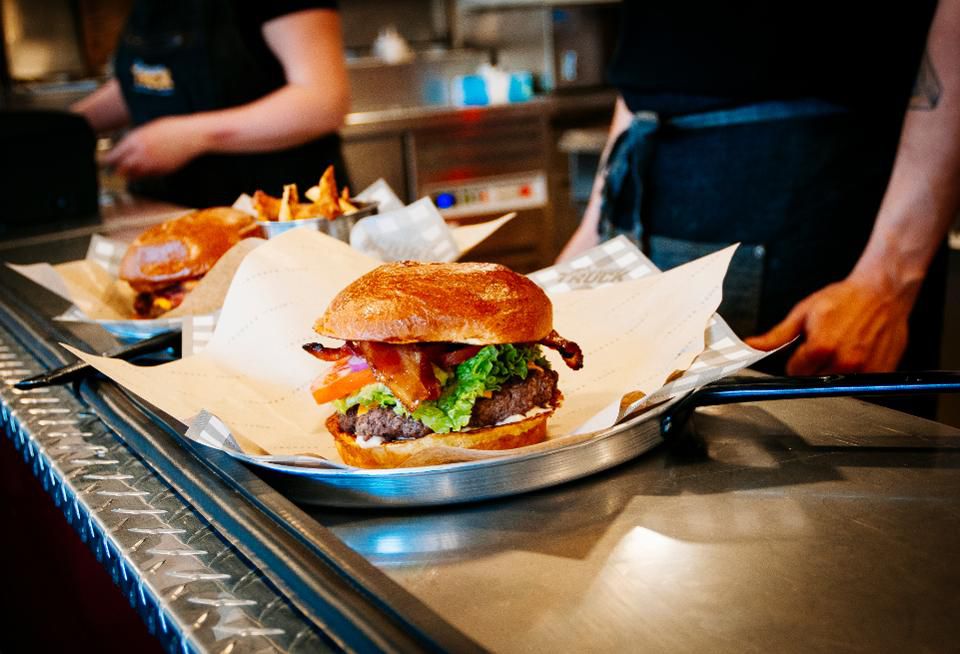
So, you’re thinking of buying a burger franchise this year? As the chief development officer of one such burger chain, you probably won’t be shocked that I think it’s a good idea. After all, I say that not just as a food fan, but because Americans have had a long love affair with the burger. In 2017, Americans ate about 26 billion pounds of beef, an 8% jump from the 24 billion pounds on plates in 1990, according to the OECD (via NBC News). Still, if you’re considering buying a burger franchise in the near future, I do have some suggestions to watch for that may inform your decisions. The burger franchise of yesterday doesn’t really look like the burger franchise of today, and the way things are going, tomorrow’s going to be a completely new day as well.
Not everyone loves burgers. Look, I love burgers, and I know it sounds insane for an executive of a restaurant that specializes in burgers to admit that not every single person in the world loves a good burger. But as crazy as it sounds, burgers have competition from plenty of other foods — including, lately, non-meat producers, sometimes called alt-meat producers. Beyond Meat is a plant-based burger that has gotten a lot of press lately, and cattle ranchers reportedly aren’t happy (paywall). But I see that as an opportunity for burger restaurants and not necessarily a call to doom.
First of all, if you’re buying a franchise that specializes in burgers, hopefully the restaurant you’re looking at is offering foods other than burgers (which most do). There’s always that fear of every restaurant owner and executive that one person who doesn’t want a burger — but a salad or a chicken sandwich — will deter their group from dropping by. That’s why, no matter what you serve, you always want to offer some alternatives. (It’s what I call the “veto vote” conundrum. You have to overcome the one person in the car on the way to lunch who wants something else).
But the real opportunity here is that while newer alt-meats and similar trends may attract their fans, the burger franchises can also become, in a sense, even more valuable and special. After all, an alt-burger, no matter how good it tastes, is not a burger. Presumably, customers who sample alt-burgers and like them are still going to want burgers, and when they want one, where are they going to go? They’ll go to the burger franchise they feel will best satisfy their taste buds. Assuming your franchise specializes in making really good burgers, you could find your product in more demand by offering options — not less. We’ll see. Alt-meat is a trend to watch out for, but just as Amazon.com hasn’t killed all online retail shops and Netflix has managed to co-exist with TV and movie theaters, alt-meats and other trends won’t kill the burger franchises (not the good ones, anyway). And that’s my point. A generation or two ago, a burger franchise could get away with mediocrity or something just above that. They can’t today.
Tastes are changing. Nobody I know wants to eat the same thing over and over — that’s why many restaurants feature “limited time only” options. If you keep adding new options and keeping them, someday your menu will have too many items, and, well, you can imagine the fun your staff will have with that. So if you’re looking for a burger franchise to buy or invest in, make sure you pick one that understands that times and tastes are changing. For instance, Restaurant Burger Magazine reported a few months ago that while cheddar is the leading cheese on burgers and has been for some time, more customers are clamoring for more variety, like fresh mozzarella and Muenster and even goat cheese. A burger franchise needs to recognize that customers, especially younger ones, may want to see something sophisticated on the menu or something they can’t find anywhere else — and that can mean offering limited-time-only (LTO) offerings with different cheeses, condiments or buns or certain types of themed burgers from a region of the country or another country entirely.
Most franchises I know of — burger or not — are offering LTOs, and they dorecognize the need for variety and to get consumers excited so that they’ll come back sooner rather than later. But, still, don’t assume that the burger franchise you’re looking at has gotten the memo.
People don’t want to have to work to get their food. People are stretched more than ever for time, or it feels that way, anyway. And while there will always be people who want to come into a restaurant and kick back, relax and hang out, you’ll get far more consumers if you make your business as accessible as possible. Is the franchise you’re looking at capitalizing on these trends? Are they partnering with delivery services? Or are they perhaps investing in food trucks so they can get their food out to people in other communities? Are they making their menu system as easy as possible to navigate for people inside the restaurant so they aren’t inconvenienced when they do come in?
In other words, is the franchise you’re interested in constantly innovating and improving how it does its business? Then you may have found yourself a franchise that will see a lot of growth and potential in the future.
There are exceptions to these trends. But if what’s on your burger franchise’s menu, literally and figuratively, seems stale, you may want to think very carefully before you make any decisions. Because what you’re perceiving probably isn’t your imagination. And your customers will likely pick up on your restaurant’s sluggish energy.